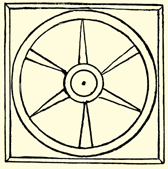We open our selection this week with a glimpse of our forthcoming publication of Frithjof Schuon’s Primordial Meditation, an arresting work of his early years, rich in symbolic power and metaphysical penetration.
The world is a silken pall, in which lies a king, rigid and deeply enshrouded. He loves the silk in which he is wrapped, without knowing that it is a shroud, his shroud, and that beyond this shroud extends a whole living world with an immeasurable heaven. He does not want to rend the shroud, nor shatter his gilded sarcophagus, because he loves it.
Every man is this enshrouded, buried king.
• We are also happy to offer an introduction to the life of Saint Nicholas of Flüe, or “Brother Klaus”, patron saint of Switzerland and one of the most famous European hermits.
The soul lacks but one thing—God. What separates thee from Him and Him from thee and prevents Him from doing His work in thee is this, that thou desirest to be something of thyself, and to please God through thy works. God does not want thy works, but His work.
• Finally, an article by Carl Ernst on “The Symbolism of Birds and Flight in the Writings of Ruzbihan Baqli”, affording an insight into this important aspect of Sufi literature.
Ruzbihan reminds us that the flight of the bird covers the distance between heaven and earth; its arrival on earth and its departure to heaven imitate and embody the journey of the soul from its origin to its end, just as the bird’s song can praise God or deliver a scriptural epiphany to humanity. When we read Persian poets telling for the thousandth time of the nightingale’s song to the rose, or the bird who nests in eternity, we should not be lulled into dullness, anaesthetized by mere repetition. Mystical authors like Ruzbihan can help us recover the experiential power of a symbol…




